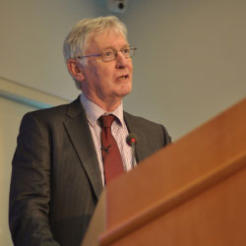Lord Wallace of Saltaire has warned that charities that receive too much government funding “cease in some ways to be an entirely voluntary organisation”.
Lord Wallace of Saltaire, the Cabinet Office spokesman in the Lords, told a debate on the role of the voluntary sector yesterday that public funding for charities was "a large issue for the future".
“I worry about the parts of the voluntary sector that are over-dependent on public funding," he said. "If a voluntary organisation is dependent on the state for most of its funding, it ceases in some ways to be an entirely voluntary organisation. That seems to me a large issue for the future.” He said.
He said that the UK had become too centralised and “that decentralisation – both from Whitehall to local authorities and, as far as possible from a relationship between large national charities and the state to one in which local authorities and other local bodies relate to charities - is healthier.”
Baroness Scott of Needham Market started the debate by saying that the lines between the public, private and voluntary sector “are really quite blurred” citing the voluntary sector’s involvement in the Work Programme.
She said she was in favour of charities increasingly delivering public services, but that she had concerns about its effect on charities.
“We have to recognise that it limits the ability of the charity or voluntary organisation to set its own priorities,” she said.
She added: “It also compromises the perception of the public about the charity as independent of government. That has come out very clearly in the report published by the Charity Commission today: when a charity becomes dependent on public contracts for its survival, its independence can be jeopardised.”
Overstepping the campaigning line
Alluding to Oxfam’s recent campaign, which a Conservative MP has reported to the Charity Commission, the Tory peer Lord Patten said: “Too many organisation tipping their campaigning activities over the edge from campaigning about poverty, say, into the politics of poverty.”
“There is a clear difference between campaigning and advocacy,” he added.
Lord Wallace disputed that there was a difference between two and but said: “There is a point at which campaigning and advocacy becomes political in a partisan way, and therefore approaches a boundary over which campaigners should not step.”
He said that he was confident that the Charity Commission had enough powers to deal with charities that overstep the mark.
Labour peer Lord Kennedy of Southwark cautioned the government against labelling campaigns it doesn’t like as ‘political’.
“Just because they do not like something that an organisation is saying, it does not follow that it is running a political campaign,” he said.
The executive editor of the Times and Conservative peer Lord Finkelstein urged charities that have examples their ability to campaign has being affected by the Lobbying Act to write to him.
He described the cap on campaigning spend as “modest” but said he wanted to “demonstrate my respect for the concerns of voluntary organisations by attempting to establish how much truth there actually is in the gagging allegation, which would certainly be serious if proven”.
Any charity that feels it has been gagged should write to him, and he will report on his findings.
“I wish to establish whether any such gagging ever takes place, whether indeed the action being prevented is against the law, which I believe it rarely will be, and whether those few against the law are simply reasonable spending limits or unreasonable limits on free speech,” he said.
Social investment
Lord Hodgson said social investment could be a “game changer” for the sector but warned that there is a “fundamental problem” that the government needs to address.
He explained that charities must always act for public benefit, but when engaged in social investment activities there is a financial return for investors “albeit a modest one”.
The current law permits a level of private benefit from charity that is “necessary and incidental”. Hodgson proposes replacing “incidental” with the word “proportionate”.
“Without that change there is a real danger that is important movement may be stifled”.
Lord Wallace said that the Law Commission has been asked to look at the issue and he will come back to Lord Hodgson with a response.









